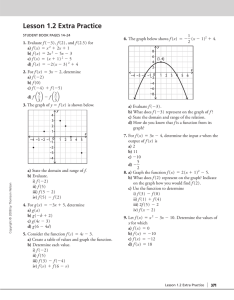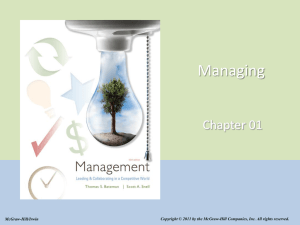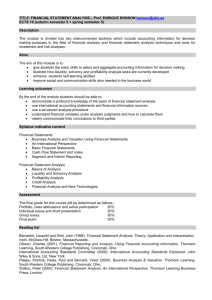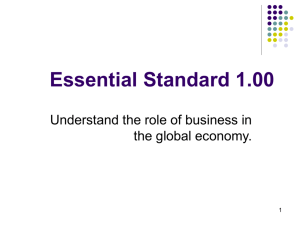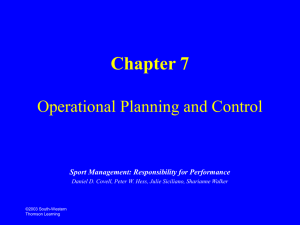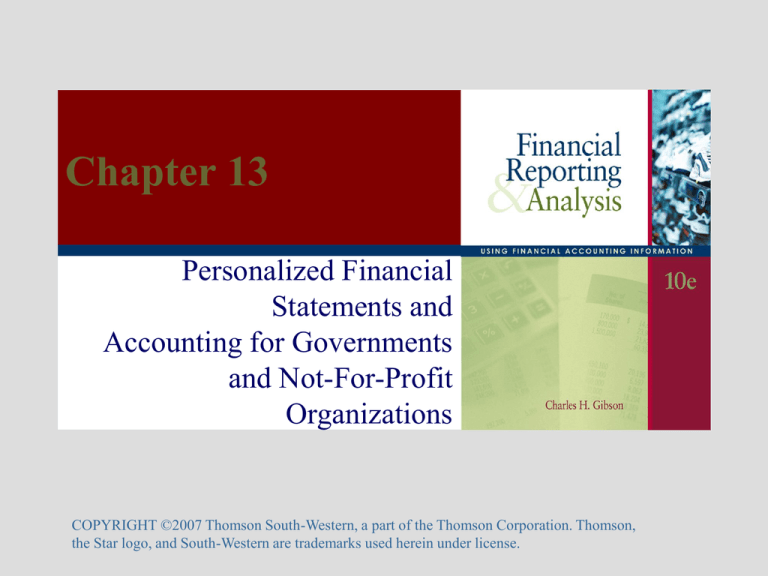
Chapter 13
Personalized Financial
Statements and
Accounting for Governments
and Not-For-Profit
Organizations
COPYRIGHT ©2007 Thomson South-Western, a part of the Thomson Corporation. Thomson,
the Star logo, and South-Western are trademarks used herein under license.
Personal Financial Statements
• Prepared for
– Individuals
– Husband and wife
– Larger family groups
• For the purpose of
–
–
–
–
Obtaining credit
Tax planning
Retirement planning
Estate planning
Chapter 13, Slide #2
Copyright 2007 by Thomson South-Western, a part of The Thomson Corporation. All rights reserved.
Personal Financial Statements (cont’d)
• Statement of financial condition
– Similar to the business entity balance sheet
– Prepared on the accrual basis
– Assets reported at their estimated current values
• Presented in order of liquidity
– Liabilities reported at their estimated current
amounts
• Presented in order of maturity
Chapter 13, Slide #3
Copyright 2007 by Thomson South-Western, a part of The Thomson Corporation. All rights reserved.
Personal Financial Statements (cont’d)
• Statement of financial condition
– Tax liability for the difference between the stated
amounts and tax basis amounts of the reported
assets and liabilities
– Excess of assets over liabilities is described as net
worth
Chapter 13, Slide #4
Copyright 2007 by Thomson South-Western, a part of The Thomson Corporation. All rights reserved.
Personal Financial Statements (cont’d)
• Statement of changes in net worth
– Realized increases (decreases) in net worth
•
•
•
•
Salaries
Dividends
Income taxes
Personal expenditures
– Unrealized increases (decreases) in net worth
• Change in current value of securities
• Change in current value of personal residence and other
real estate
• Change in estimated tax liability for the difference between
the stated amounts and tax basis amounts of the reported
assets and liabilities
Chapter 13, Slide #5
Copyright 2007 by Thomson South-Western, a part of The Thomson Corporation. All rights reserved.
Personal Financial Statements (cont’d)
• Reviewing the Statement of Financial
Condition
–
–
–
–
Net worth indicates the level of wealth
Identify very liquid (readily available) assets
Note the due dates of liabilities
Compare specific assets with related liabilities
Chapter 13, Slide #6
Copyright 2007 by Thomson South-Western, a part of The Thomson Corporation. All rights reserved.
Personal Financial Statements (cont’d)
• Reviewing the Statement of Changes in Net
Worth
– Review realized and unrealized changes in net
worth
– Observe whether the net realized and unrealized
amount increased or decreased
– Observe whether the net change increased or
decreased
– Observe the net worth at the end of the year
Chapter 13, Slide #7
Copyright 2007 by Thomson South-Western, a part of The Thomson Corporation. All rights reserved.
Governments
• Terminology
–
–
–
–
–
Appropriations
Debt service
Capital projects
Special assessments
Enterprises
Chapter 13, Slide #8
Copyright 2007 by Thomson South-Western, a part of The Thomson Corporation. All rights reserved.
Governments (cont’d)
• Terminology
–
–
–
–
–
Internal service
General fund
Proprietary funds
Fiduciary funds
Encumbrances
Chapter 13, Slide #9
Copyright 2007 by Thomson South-Western, a part of The Thomson Corporation. All rights reserved.
Governments (cont’d)
• Accounting authority
– 1980: Governmental Accounting Standards Board
Organizing Committee
– 1984: Governmental Accounting Standards Board
• Auspices of the Financial Accounting Foundation
• 7-member board
• Pronouncements: Governmental Accounting Standards
Board Statements
Chapter 13, Slide #10
Copyright 2007 by Thomson South-Western, a part of The Thomson Corporation. All rights reserved.
Governments (cont’d)
• Fund accounting
– Funds: Independent fiscal and accounting entity
with a self-balancing set of accounts
– Basis used: cash, modified accrual, or accrual
• Trend is towards modified accrual
• Some states require modified accrual basis
– Categories of funds
• Governmental
• Proprietary
• Fiduciary
Chapter 13, Slide #11
Copyright 2007 by Thomson South-Western, a part of The Thomson Corporation. All rights reserved.
Governments (cont’d)
• Governmental funds
– Account for the general operations of government
• Proprietary funds
– Account for maintaining capital or producing income
• Fiduciary funds
– Account for assets held in a trustee or agency
capacity
Chapter 13, Slide #12
Copyright 2007 by Thomson South-Western, a part of The Thomson Corporation. All rights reserved.
Governments (cont’d)
• Financial statements (GASB 34)
–
–
–
–
Management discussion and analysis (MD&A)
Government-wide and fund financial statements
Notes to the financial statements
Required supplementary information
Chapter 13, Slide #13
Copyright 2007 by Thomson South-Western, a part of The Thomson Corporation. All rights reserved.
Minimum Requirements for GeneralPurpose Financial Statements
MD&A
Government-Wide
Financial Statements
Fund Financial
Statements
Notes to the Financial Statements
Required Supplementary Information
Chapter 13, Slide #14
Copyright 2007 by Thomson South-Western, a part of The Thomson Corporation. All rights reserved.
Governmental General Purpose
Financial Statements
• MD&A
– Provides an objective analysis of the financial
activities of the government based on known acts,
decisions, and conditions
– Provides financial managers with the opportunity to
present both a short-term and a long-term analysis
of the government’s activities
• Government-wide financial statements
– Prepared on the accrual basis
Chapter 13, Slide #15
Copyright 2007 by Thomson South-Western, a part of The Thomson Corporation. All rights reserved.
Governmental General Purpose
Financial Statements (cont’d)
• Fund financial statements
– Governmental funds
• Modified accrual basis
– Proprietary funds
• Accrual basis
– Fiduciary funds
• Accrual basis
• Required reconciliation
– Reconcile fund financial statements to the
government-wide financial statements
Chapter 13, Slide #16
Copyright 2007 by Thomson South-Western, a part of The Thomson Corporation. All rights reserved.
Governmental General Purpose
Financial Statements (cont’d)
• Notes to the financial statements
– Similar to corporate reporting
– Must also present the original and revised budgets
for the reporting period
• Statistical section
–
–
–
–
–
Historical
Financial
Analytical
Economic
Demographic
Chapter 13, Slide #17
Copyright 2007 by Thomson South-Western, a part of The Thomson Corporation. All rights reserved.
Governmental General Purpose
Financial Statements (cont’d)
• Independent auditor’s report
– Contains information relating to both financial
information and the internal controls of the entity
• Component units
– Legally separate organizations
– Significant relationship to the governmental entity
– Elected officials of the primary government are
financially accountable
Chapter 13, Slide #18
Copyright 2007 by Thomson South-Western, a part of The Thomson Corporation. All rights reserved.
Not-for-Profit Organizations
• Examples of not-for-profit organizations
–
–
–
–
–
Hospitals
Religious institutions
Professional organizations
Universities
Museums
Chapter 13, Slide #19
Copyright 2007 by Thomson South-Western, a part of The Thomson Corporation. All rights reserved.
Not-for-Profit Organizations (cont’d)
• Accounting authority
– Generally Accepted Accounting Principles
• SFAS 93: Recognition of Depreciation by Not-for-Profit
Organizations
• SFAS 116: Accounting for Contributions Received and
Contributions Made
• SFAS 117: Financial Statements of Not-for-Profit
Organizations
• SFAS 124: Accounting for Certain Investments Held by
Not-for-Profit Organizations
Chapter 13, Slide #20
Copyright 2007 by Thomson South-Western, a part of The Thomson Corporation. All rights reserved.
Not-for-Profit Organizations (cont’d)
• SFAS 93: Recognition of Depreciation by Notfor-Profit Organizations
– Requires depreciation of long-lived tangible assets
– Exempts assets that meet two requirements
• Asset has value worth preserving in perpetuity
• Organization has the ability to preserve the asset
Chapter 13, Slide #21
Copyright 2007 by Thomson South-Western, a part of The Thomson Corporation. All rights reserved.
Not-for-Profit Organizations (cont’d)
• SFAS 116: Accounting for Contributions
Received and Contributions Made
– Contributions Received
• Revenue in the period received
• Measured at fair value
• Reported as restricted or unrestricted
– Exemptions
• Contributed items are held for public service
• Contributed items are protected and preserved
Chapter 13, Slide #22
Copyright 2007 by Thomson South-Western, a part of The Thomson Corporation. All rights reserved.
Not-for-Profit Organizations (cont’d)
• SFAS 117: Financial Statements of Not-forProfit Organizations
– Statement of financial position
• Assets and liabilities are reported in homogeneous groups
• Net assets are classified as permanently restricted,
temporarily restricted, or unrestricted
– Statement of activity
• Revenues and expenses are separated into homogeneous
groups
• Activities are classified as affecting permanently restricted,
temporarily restricted, and unrestricted assets
• Discloses changes in the amounts of permanently
restricted, temporarily restricted, and unrestricted net
assets
Chapter 13, Slide #23
Copyright 2007 by Thomson South-Western, a part of The Thomson Corporation. All rights reserved.
Not-for-Profit Organizations (cont’d)
• SFAS 117: Financial Statements of Not-forProfit Organizations
– Statement of cash flows
• Comply with SFAS 95
• Financing activities include receipts restricted for
acquiring, constructing, or improving long-lived assets
Chapter 13, Slide #24
Copyright 2007 by Thomson South-Western, a part of The Thomson Corporation. All rights reserved.
Not-for-Profit Organizations (cont’d)
• SFAS 124: Accounting for Certain Investments
Held by Not-for-Profit Organizations
– Equity securities with readily determinable fair value
are reported at fair value
• Does not apply to equity-method investments or
consolidated investments
– All investments in debt securities are shown at fair
value
– Realized and unrealized gains and losses are
shown on the statement of activities
Chapter 13, Slide #25
Copyright 2007 by Thomson South-Western, a part of The Thomson Corporation. All rights reserved.
Not-for-Profit Organizations (cont’d)
• Applicability of GAAP to not-for-profit
organizations
– AICPA’s SOP 94-2
• All GAAP applies to not-for-profit organizations unless
– Specifically exempted
– Subject matter precludes applicability
Chapter 13, Slide #26
Copyright 2007 by Thomson South-Western, a part of The Thomson Corporation. All rights reserved.
Not-for-Profit Organizations (cont’d)
• Budgeting
– Difference from profit-oriented enterprises
• Accounting for not-for-profit organizations does not include
the entity concept or efficiency
• Net income is not an available measure for not-for-profit
organizations
– Objective-based budgeting
• Identify objectives of the entity
• Develop a budget that supports the objectives
– Measures of productivity as assessment
• Productivity achieved that relate to objectives reflect the
success of the entity’s operations
Chapter 13, Slide #27
Copyright 2007 by Thomson South-Western, a part of The Thomson Corporation. All rights reserved.

